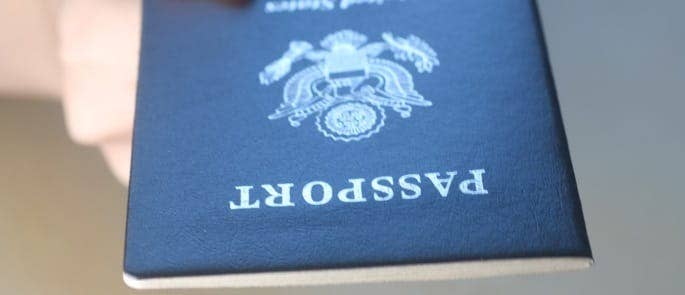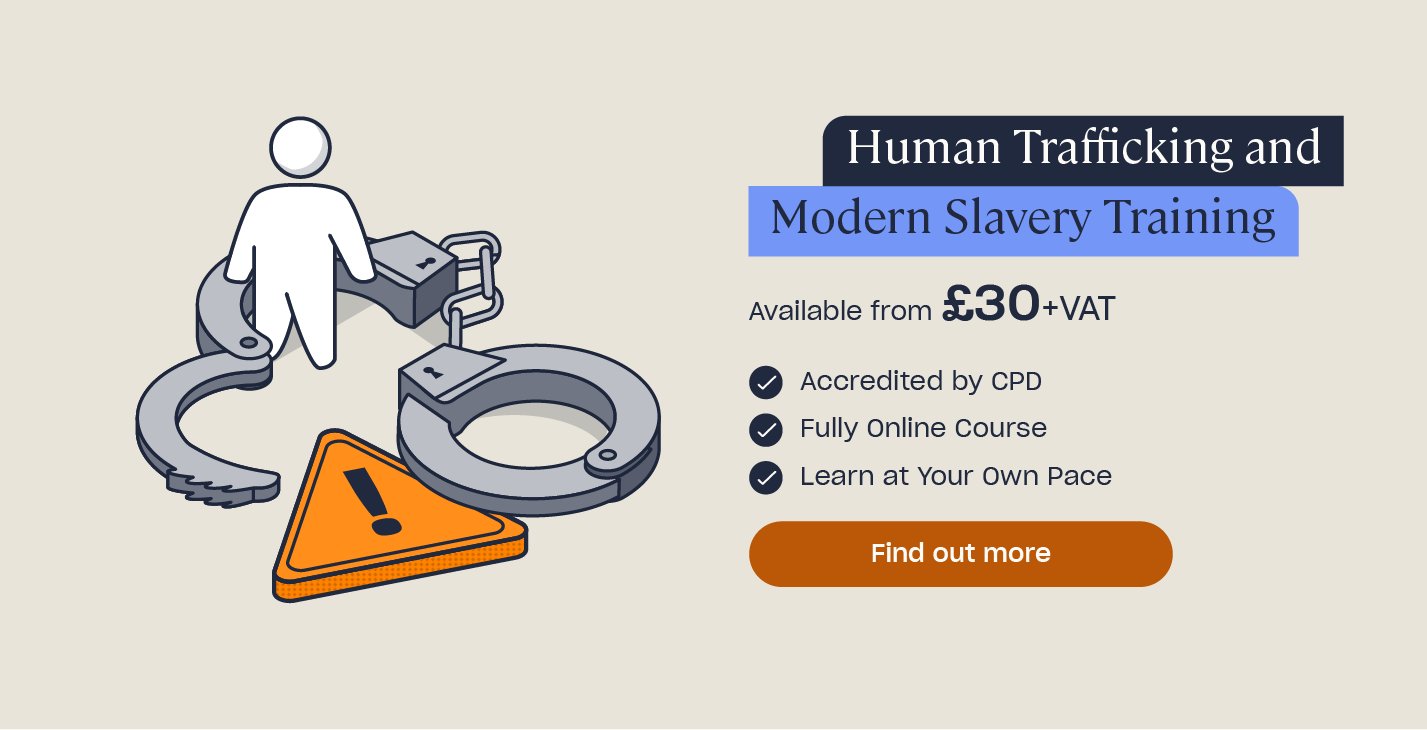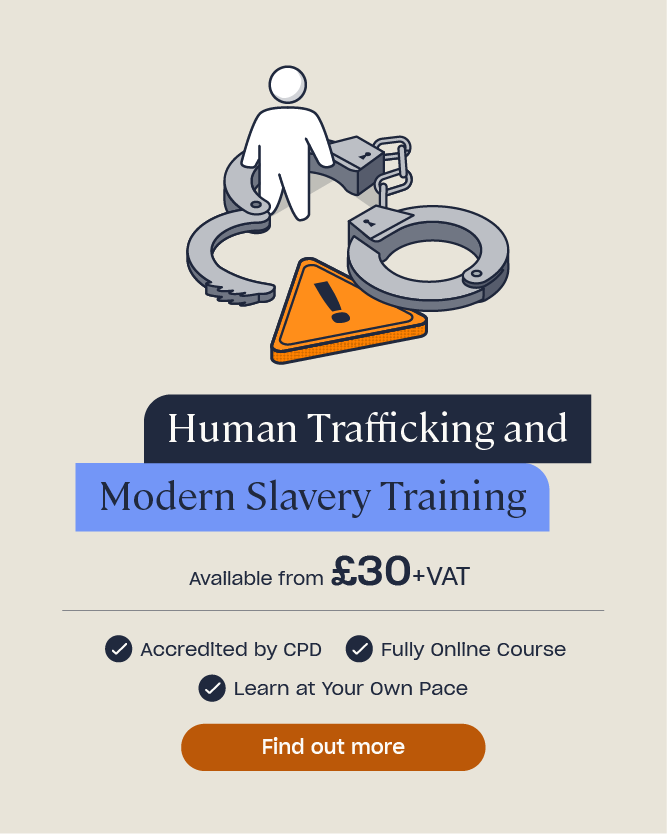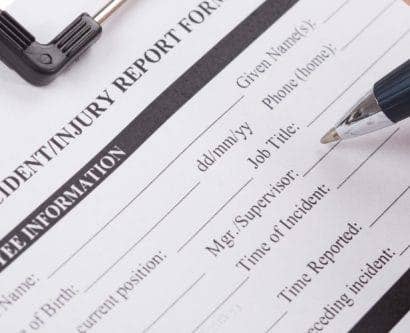Writing a Modern Slavery Policy: Guidance for Employers
Slavery isn’t just a thing of the past, and it doesn’t just happen overseas. In fact, the government estimates that tens of thousands of people in the UK are victims of modern slavery. Therefore, it’s important that you understand what it is and how to create a modern slavery policy to safeguard against it.

In 2015, the Modern Slavery Act was introduced to police modern slavery in the UK. The introduction of this law enforced greater responsibility on big UK businesses to tackle slavery in their global supply chains. It affects all types of companies whether they are private or public, and includes partnerships. The Act states that, if you own a business with an annual global turnover of over £36 million pounds (the level subscribed by the Secretary of State) and carry on part or all of your business in the UK, you must produce a ‘slavery and human trafficking statement’ for each financial year.
Need a Course?
Our Human Trafficking and Modern Slavery Training is designed to provide learners with an awareness of the signs of exploitation and trafficking in the UK.
What to Include in a Modern Slavery Policy
The content of a statement differs from business to business, but there are sections that the government recommends you include. This article will outline these sections and help you understand what you need to include in your Modern Slavery Statement, so you can comply with your legal requirements.
Each of the following sections corresponds to a section you should include in your Modern Slavery Statement.
Policy Statement
Both modern slavery and human trafficking are covered in the provisions of the Act. The term ‘modern slavery‘ describes anyone forced into labour, owned or controlled by an ‘employer’, treated as a commodity (i.e. bought or sold) or physically constrained. Human trafficking describes the practice of illegally transporting someone from one area or country to another, usually for the purposes of being sold into modern slavery. A person does not need to be taken out of their home country to be considered a victim of human trafficking. However, it is commonly accepted that the majority of modern slaves in the UK are trafficked from overseas to work in the agricultural, construction, hospitality, manufacturing and car washing industries. Additionally, many adults and children are trafficked and sold for domestic slavery or sexual exploitation.
You should begin your statement by detailing your organisation’s commitment to ethical practices. Within this part of your statement you should:
- Condemn modern slavery and human trafficking.
- Detail your dedication to ensuring that modern slavery does not take place at any point during your business or supply chains.

A slavery and human trafficking statement is a document that sets out the steps an organisation has taken during the financial year to ensure that neither slavery or human trafficking is occurring in any part of its supply chain or its own business.
It can also include:
- The name of your business.
- Your annual turnover.
- The organisational structure of your business.
- What your business does. This includes a summary of your business sector, operations and details of your supply chains. You should provide details of all countries and regions in which you directly operate, as well as the operations carried out there.
- The names and details of any subsidiaries you might have.
- The number of people you employ and how many customers you serve annually.
- The policy you have in place regarding slavery and human trafficking and who the policy applies to.
Level of Risk
Within your statement, you should also include the measures you have taken to identify and manage the risks of human trafficking and slavery occurring within your business or supply chain. You should detail:
- Any high-risk areas of your business in regards to slavery and human trafficking.
- How you’ve identified and assessed these areas.
- What steps you have taken to mitigate the risks of slavery and human trafficking within your business and supply chains.
- How you monitor high-risk areas within your business and supply chain.
You should also detail that you have a zero-tolerance attitude towards human trafficking and slavery at all points within your supply chain, and the strategies you enforce to ensure complete supply chain compliance. You can also include information about training that is available to your staff about slavery and human trafficking.
Company Policies
In this section of your modern slavery statement, you should outline the relevant policies you have that ensure you conduct all business in an ethical manner and are committed to being a transparent organisation. This could include your:
- Anti-slavery policy. This policy should detail your company’s stance on modern slavery and human trafficking, who has responsibility over the policy and how your employees can identify and report suspicions.
- Whistleblowing policy. Your whistleblowing policy should be used to ensure your employees feel comfortable raising concerns without fear of repercussion.
- Recruitment policy. All companies should have a strict recruitment policy that checks the eligibility of workers for UK employment.
- Code of conduct. This policy should detail the standards you expect your organisations, employees and suppliers to meet.
- Training policies. You should also detail the training you will provide to your employees. The type of training they require may differ depending on the employee’s position.

Your policies apply to everyone who works for your organisation. Therefore, you must state that all employees must read and understand the information contained within them. You might also need to specifically mention certain roles, such as those who have more responsibility over ensuring everyone meets the company standards on slavery and human trafficking. For example, the head of the department who works directly with suppliers might need more in-depth training.
Company Suppliers
Your zero-tolerance commitment to slavery and human trafficking must also stand when you choose suppliers. Therefore, your policy should detail how you will use due diligence to find and use suppliers who will also demonstrate a commitment against modern slavery and human trafficking. To do this, you could map out your supply chain and identify the high-risk areas within it. You should regularly carry out supplier audits to ensure that they all adhere to your standards.
You should also detail the policies you enforce should any of your suppliers fail to meet the standards you set. This could include asking them to improve or terminating their contracts with you.
Policy Approval
Depending on the corporation you run, the type of approval you need for your statement changes:
- Body corporate that is not a limited liability partnership: your policy must be approved by the board of directors, or equivalent, and signed by a director, or equivalent.
- Limited liability partnership: your policy must be approved by the members and a designated member must sign it.
- Limited liability partnership registered under the Limited Partnership Act 1907: your policy must be signed by a general partner.
- Any other kind of partnership: your policy must be signed by a partner.
Your anti-slavery policy should be available online and clearly linked on your website so it is easy to find. By creating a detailed ‘slavery and human trafficking statement’, you will show your customers that you are committed to carrying out your operations ethically. You will also comply with your legal responsibility under the Modern Slavery Act.
What to Read Next:
- What is the Difference Between Arranged Marriage and Forced Marriage?
- Methods of Human Trafficking and Recruitment
- Signs of Abuse in Adults
- Human Trafficking and Modern Slavery Training











